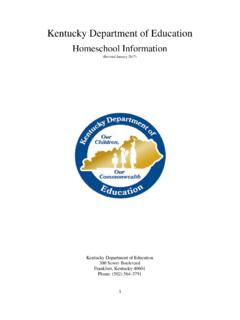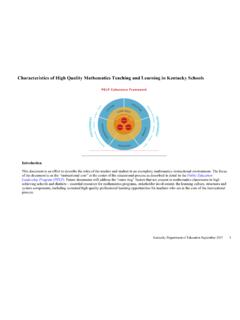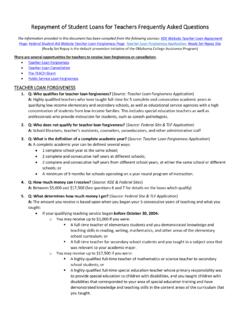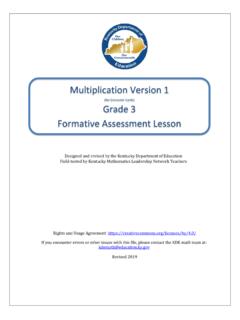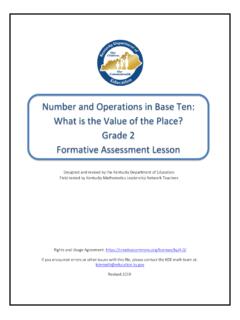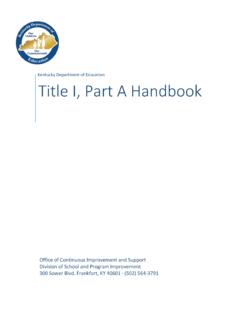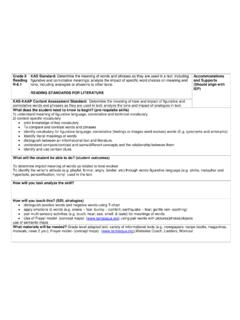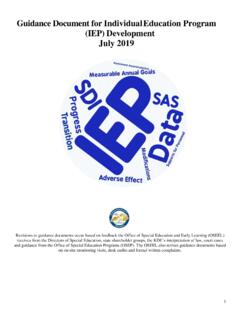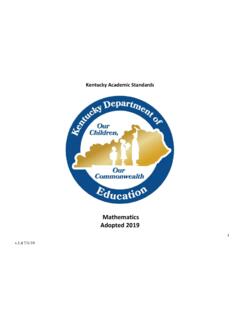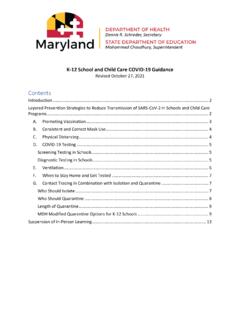Transcription of Kentucky Academic Standards for Social Studies
1 Kentucky Academic Standards Social Studies July 2019 2 TABLE OF CONTENTS TABLE OF CONTENTS ..2 INTRODUCTION ..5 Background on the Kentucky Academic Standards for Social Studies : Educating for Civic Life in a Democracy .. 5 Kentucky s Vision for Students .. 6 Legal Basis .. 7 Standards Creation Process .. 9 Writers Vision Statement .. 10 Design Considerations .. 11 Standards Use and 12 The Kentucky Academic Standards (KAS) are Standards , not Curriculum .. 12 Translating the Standards into Curriculum .. 12 Organization of the 13 Discipline Strand Key .. 14 Applying Disciplinary Concepts and Practices .. 16 Kindergarten through Grade 8 Annotated Standards Chart .. 22 High School Annotated Standards Chart .. 23 Kentucky Academic Standards FOR Social Studies : KINDERGARTEN-GRADE 5 OVERVIEW .. 25 Kindergarten: Myself and My 26 Specific Overview .. 26 Kindergarten: Myself and My Community Standards .. 29 Kindergarten: Disciplinary Clarifications and Instructional Support .. 31 Grade 1: Impact on Community and 36 Specific Overview.
2 36 Grade 1: Impact on Community and State Standards .. 39 Grade 1: Disciplinary Clarifications and Instructional Support .. 42 Grade 2: North American Interactions .. 48 Specific Overview .. 48 Grade 2: North American Interactions Standards .. 51 Grade 2: Disciplinary Clarifications and Instructional Support .. 54 3 Grade 3: Global 60 Specific Overview .. 60 Grade 3: Global Interactions Standards .. 63 Grade 3: Disciplinary Clarifications and Instructional Support .. 66 Grade 4: Migration and Settlement .. 73 Specific Overview .. 73 Grade 4: Migration and Settlement Standards .. 76 Grade 4: Disciplinary Clarifications and Instructional Support .. 79 Grade 5: Colonization to Constitution .. 84 Specific Overview .. 84 Grade 5: Colonization to Constitution 87 Grade 5: Disciplinary Clarifications and Instructional Support .. 90 Kentucky Academic Standards FOR Social Studies : GRADE 6-8 OVERVIEW .. 96 Grade 6: Development of Civilizations .. 97 Specific Overview .. 97 Grade 6: Development of Civilizations Standards .
3 100 Grade 6: Disciplinary Clarifications and Instructional Support .. 104 Grade 7: Growth and Expansion of Civilization ..111 Specific Overview .. 111 Grade 7: Growth and Expansion of Civilization Standards .. 114 Grade 7: Disciplinary Clarifications and Instructional Support .. 117 Grade 8: The United States: 1600-1877 ..124 Specific Overview .. 124 Grade 8: The United States: 1600-1877 Standards .. 127 Grade 8: Disciplinary Clarifications and Instructional Support .. 132 Kentucky Academic Standards FOR Social Studies : HIGH SCHOOL OVERVIEW .. 139 High School: Civics Standards .. 141 High School: Economics 143 High School: Geography Standards .. 146 High School: United States History Standards .. 148 High School: World History Standards .. 151 4 APPENDIX A: KINDERGARTEN THROUGH HIGH SCHOOL 155 Inquiry Progressions ..155 Inquiry Progression: Questioning .. 155 Inquiry Progression: Using Evidence .. 157 Inquiry Progression: Communicating Conclusions .. 160 Civics Progressions ..164 Civics Progressions by Grade Level.
4 164 Civics Progression: Civic and Political Institutions .. 170 Civics Progression: Roles and Responsibilities of a Citizen .. 172 Civics Progression: Civic Virtues and Democratic Principles .. 174 Civics Progression: Processes, Rules and Laws .. 176 Civics Progression: Kentucky Government .. 178 Economics Progressions ..179 Economics Progressions by Grade Level .. 179 Economics Progression: Microeconomics .. 186 Economics Progression: Macroeconomics .. 188 Economics Progression: Specialization, Trade and Interdependence .. 190 Economics Progression: Incentives, Choices and Decision Making .. 192 Economics Progression: Kentucky Economics .. 194 Geography Progressions ..195 Geography Progressions by Grade Level .. 195 Geography Progression: Migration and Movement .. 201 Geography Progression: Human Interactions and Interconnections .. 203 Geography Progression: Human Environment Interaction .. 205 Geography Progression: Geographic Reasoning .. 207 Geography Progression: Kentucky Geography.
5 209 History Progressions ..210 History Progressions by Grade Level .. 210 History Progression: Change and Continuity .. 218 History Progression: Cause and Effect .. 221 History Progression: Conflict and Compromise .. 224 History Progression: Kentucky History .. 227 APPENDIX B: WRITING AND REVIEW COMMITTEES .. 228 5 Kentucky Academic Standards Social Studies INTRODUCTION Background on the Kentucky Academic Standards for Social Studies : Educating for Civic Life in a Democracy America s history is vast and complex; from past to present, it is the story of people, places, events, ideas and documents that shaped the nation today. Thomas Jefferson asserted, Educate and inform the whole mass of people. They are the only sure reliance for the preservation of our liberty. Democracy s survival depends upon the generational transmission of the political vision of liberty and equality that makes and unites Americans. The preservation of this American vision is dependent upon the willingness and ability of its citizens to collaboratively and deliberately address problems, defend their own rights and the rights of others and balance personal interests with the general welfare of society.
6 It also depends on a loyalty to the political institutions the founders created. Devotion to human dignity and freedom, equal rights, justice, the rule of law, tolerance of diversity, mutual assistance, personal and civic responsibility, self-restraint and self-respect must be learned and practiced. The preparation of young people for participation in America s democratic society is vital. The progress of communities and the state, nation and world rests upon the preparation of young people to collaboratively balance personal interest with the public good. The National Council for the Social Studies contends: The primary purpose of Social Studies is to help young people develop the ability to make informed and reasoned decisions for the public good as citizens of a culturally diverse, democratic society in an interdependent world. Civic competence requires a commitment to democratic values and the ability to use knowledge about one s community, nation and world. Social Studies classrooms are the ideal locations to foster civic virtue, apply inquiry practices, consider current issues, engage in civil discourse and build a civic identity and an awareness of international issues.
7 They should be laboratories of democracy where the diversity among learners embodies the democratic goal of embracing pluralism. Students must be taught to cherish freedom and to accept responsibility for preserving and extending it, finding their own best ways of doing so on the basis of free, independent thinking. These skills, habits and qualities of character will prepare students to accept responsibility for preserving and defending their liberties and empower them to think critically, reason and problem solve. Thus, the civic mission of Social Studies is crucial and demands the inclusion of each and every student in Kentucky . In order to prepare young people in the 21st century to carry on the ideals of the founders, Social Studies education must aim to develop students' knowledge of important Social Studies concepts and their use of disciplinary thinking skills. Achieving this aim is the mission of Social Studies education in Kentucky . The Kentucky Academic Standards for Social Studies is designed to promote the development of knowledge and skills that will produce Kentucky graduates who are civically engaged, socially responsible and culturally aware.
8 These Standards guide student exploration of the relationships and interactions among individuals and groups at local, state, national and international levels through the disciplines of civics, economics, geography and history and the inquiry practices of questioning, investigating, using evidence and communicating conclusions. The Standards are designed to include a breadth of knowledge, not as isolated facts to be simply memorized, but as useable knowledge to be integrated into an understanding of the world. 6 In order to be culturally literate, students must have knowledge of each of the four Social Studies disciplines and an appreciation for the interconnectedness of all four disciplines. This is central to students preparation for a successful transition into civic life. Prepared Kentucky graduates in Social Studies use the tools, thinking and practices of civics, economics, geography and history to: Understand the fundamental values and principles of America s democratic republic, using civic mindedness to be informed citizens, foster civic dispositions and be life-long participants in the political process.
9 Understand the interaction of buyers and sellers in markets, workings of the national economy and interactions within the global marketplace, using economic reasoning to make sound economic decisions and maximize the well-being of individuals and society. Understand the cultural, economic, Social and civic implications of life in Earth s many environments and the interplay of human activity and physical features on the Earth s surface, using geographic literacy skills to enhance quality of life, preserve resources and be life-long evaluators of what happens in the places in which they live and throughout the world. Understand America s past and what decisions of the past account for present circumstances, using historical thinking skills to confront today s problems, be informed on taking an active position on issues and make sense of the interconnected world around them. By studying these disciplines, working individually and/or collaboratively, students will read, synthesize ideas, compose and communicate ideas effectively to analyze issues from multiple perspectives, make decisions and solve problems as a responsible member of society.
10 Thus, students will be better prepared for the responsibilities and demands of civic life. Active participants in a democratic society and complex world recognize democracy s potential while also recognizing its challenges and dilemmas. Echoing the words of Rosa Parks, the writers vision is that the implementation of these Standards will help Kentucky students become culturally literate persons who are concerned about freedom and equality and justice and prosperity for all people. Kentucky s Vision for Students The Kentucky Board of Education s (KBE) vision is that each and every student is empowered and equipped to pursue a successful future. To equip and empower students, the following capacity and goal statements frame instructional programs in Kentucky schools. They were established by the Kentucky Education Reform Act (KERA) of 1990, as found in Kentucky Revised Statute (KRS) and KRS All students shall have the opportunity to acquire the following capacities and learning goals: Communication skills necessary to function in a complex and changing civilization; Knowledge to make economic, Social and political choices; Core values and qualities of good character to make moral and ethical decisions throughout life; Understanding of governmental processes as they affect the community, the state and the nation; Sufficient self-knowledge and knowledge of their mental health and physical wellness; Sufficient grounding in the arts to enable each student to appreciate their cultural and historical heritage; Sufficient preparation to choose and pursue their life s work intelligently; and Skills to enable students to compete favorably with students in other states.
